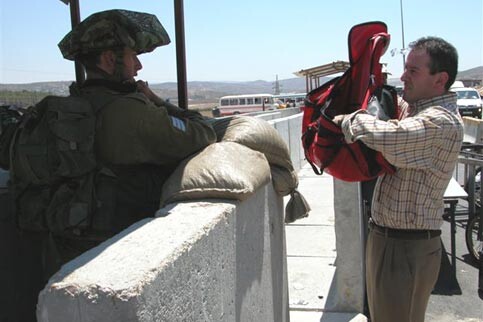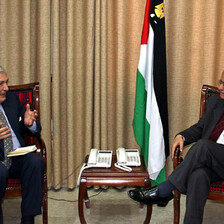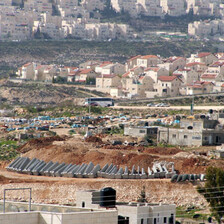The Electronic Intifada 5 July 2005

Israel is annexing as much land, water wells, and settlement blocs as possible while taking with it as few Palestinians as possible. (Markus Cuel)
In occupied Palestine, the more things change, the more they stay the same. In the last several months, we have seen the death of former Palestinian President Yasser Arafat, the election of Mahmoud Abbas, and preparations for the planned Israeli withdrawal from the Gaza Strip and a few small settlements in the north of the West Bank.
But what we haven’t seen is a change to the status-quo, a change that is desperately needed to prevent the situation from collapsing into something far worse than the first and second intifadas.
While the world’s attention is diverted to the Gaza disengagement - where some 8,000 or so settlers are to be removed, a drop in the bucket of the some 415,300 illegal settlers in the West Bank (including East Jerusalem) and the Gaza Strip - Israel is busily eating away at the land it prizes the most, and prejudicing final status issues.
And the humanitarian situation is bleak. Israel’s Annexation Wall, continuing to be built deep inside West Bank land despite the International Court of Justice’s Advisory Opinion issued last year, is cutting off farmers from their land, students from their schools, patients from hospitals, and generally disconnecting communities.
And despite promises to the Americans to act otherwise, Israel is continuing to expand settlements in Jerusalem in such a way as to cut off the rest of the West Bank from what Palestinians consider to be their capital. Israel is also building a series of walls, fences, and other annexation structures so that the larger settlement blocs - the Ariel, Etzion, and Ma’ale Adumim blocs - will be included on the western or “Israeli” side of the wall.
The route of the wall around these major settlement blocs is a naked attempt to predetermine the borders of a future Palestinian state. It also divides the West Bank into three cantons, as these settlements cut into the north, south, and the central West Bank.
So brazen is Israel, it no longer finds the need to cover up the wall’s true purpose. Ha’aretz reports that in response to an appeal to the Israeli High Court filed by Azun village in the West Bank, whose land is being annexed because of the wall, the Israeli government “asked for the fence [sic] to be left on its original route, previously ruled to be unsuitable … .” The reason - it would be too expensive to move, undermining Israel’s claims that the wall is a “temporary” security measure.
And last week it was reported that the Israeli agricultural ministry has developed plans to double the settler population in the Jordan River Valley, creating another barrier to prevent Palestinian connection to Jordan. Israeli Minister of Agriculture Israel Katz told the Israeli paper Yedioth Ahronot, “Abu Mazen [Palestinian President Mahmoud Abbas] and the leaders of the terror organisations will look out the Muqata’a [the Palestinian Authority headquarters] window every morning and see the Israeli Jordan Valley flourishing.”
Indeed, other recent statements by Israeli officials are less than reassuring.
In a speech he gave to the ORT Brande College of Engineering in Karmiel, Israeli Prime Minister Ariel Sharon said, “The disengagement plan is not only a decision to leave Gaza, but also a decision to invest more in the development of the Negev, the Galilee and greater Jerusalem.”
Unfortunately for the Palestinians, part of Israel’s investment in East Jerusalem is the destruction of some 88 homes in the Arab neighborhood Silwan for the purpose of establishing a biblical park, making homeless a thousand Palestinian residents. Though the decision is being contested in the courts, and the situation is unresolved, it is just one more example of life becoming harder and harder for Palestinians in Jerusalem.
Israel has been “investing” in Jerusalem in order to impose a Jewish demographic majority for some time now, through such means as not granting Palestinians building permits and then destroying “illegal” houses built without permits, stunting economic growth by restricting movement across the numerous checkpoints in East Jerusalem villages, stamping out Palestinian political activity, and by drafting discriminatory family unification laws that make it a Sisyphean task for Arabs to gain residency rights, and thus severing families comprised of both Jerusalemites and West Bankers.
Israel is so concerned with in maintaining a Jewish majority in the face of higher Palestinian birth rates that it has become a point of obsession. In a presentation in favor of a controversial plan to establish tens of thousands of housing units in Jewish neighborhoods in West Jerusalem (to maintain a 70:30 percent Jewish to Arab ratio in the city), Jerusalem City Engineer Uri Sheetrit said, “Jerusalem is in crisis! Jerusalem must be saved, and now is the only time to do so!”
He added, “As city engineer, and as the mayor’s representative, I am not ashamed to openly declare: We must guarantee that Jerusalem maintains its Jewish majority forever.”
The point is this. Israel is not disengaging from Gaza out of charity to the Gazan Palestinians, many of whom have never even seen the Mediterranean Sea that borders the Strip because the settlements were constructed on the choicest pieces of land. Instead, Israel is withdrawing from Gaza because there is no way it can annex the settlement blocs there without taking with it the Palestinian population. And as the Palestinian population in the Gaza Strip, one of the most densely populated places on Earth, vastly outnumbers the small settler population - though settlers comprise only 0.6 percent of Gaza’s population, Israel controls 42 percent of Gaza land - demographically, Israel can’t afford to annex the Palestinians as well.
Like Israel isn’t withdrawing out of humanitarian concerns, its wall isn’t being built merely for security considerations. Maps make it quite clear that Israel is annexing as much land, water wells, and settlement blocs as possible while taking with it as few Palestinians as possible. Greatly deviating from the internationally recognized 1967 borders (1967 is the year Israel illegally occupied the West Bank and Gaza Strip), the wall is intended to be a political border.
Even as the Israeli daily Ha’aretz recently reported, “The [Israeli] State Prosecution argued for the first time on Tuesday that the government’s decision to construct the separation fence in the Jerusalem area stemmed from political considerations as well as security purposes.”
In short, Israel’s current actions are being conducted with its long-term future as a Jewish state in mind — expanding settlements, further clenching its grip over Jerusalem, and predetermining future borders — all in violation of the US-backed “Roadmap to Peace” that both Israel and the Palestinians are party to.
And the US’s reaction? Half-hearted public rebukes of Israel, demands that the Palestinian Authority do more to fight terror (though Palestinian violence has virtually ceased without any reward), and the unabated funding of the very foreign military occupation that perpetuates the conflict.
During her visit two weeks ago, US Secretary of State Condoleezza Rice was apparently more concerned by Israel’s arms sales to China that Israel’s aggressive actions in the Palestinian territories. The diplomatic row between the US and Israel over Israel’s arms sales to China was so severe that Israel was compelled to make a public apology for the affair.
On the subject of settlement expansion, Rice told an Israeli official, “We don’t want it to be a problem but it will.” However, settlement expansion already is a problem and settlement building has been a problem for a few decades now. Rice also warmed of any Israeli moves that would create the “appearance” of facts on the ground, not going so far as to call Israel’s projects in the territories the facts they are, or doing anything to stop it.
The US, as the only third party with the ability to seriously influence Israel’s actions, cannot afford to fail right now. Hamas and Islamic Jihad, along with the other Palestinian political factions, have largely laid down their guns. Should they not be given any reward in return (indeed, last week Israel attempted to assassinate Islamic Jihad activists), the Palestinian Authority will be impotent to ask them to observe any future cease-fire.
And with no positive change to the status quo in sight, the situation seems on the brink of collapse. And as Palestinians have waited out one shoddy negotiation process after another, their patience is likely to run out soon. And the next uprising, many here fear, will bring something far worse that anything we’ve seen yet.
Currently based in Ramallah, Maureen Clare Murphy is Arts, Music and Culture Editor for The Electronic Intifada
Related Links




